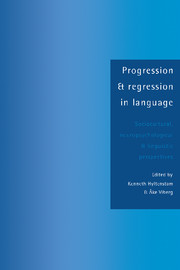 Progression and Regression in Language
Progression and Regression in Language Book contents
- Frontmatter
- Contents
- List of contributors
- Preface
- INTRODUCTION
- THE SOCIOCULTURAL SETTING
- PSYCHO- AND NEUROLINGUISTIC ASPECTS
- THE LINGUISTIC PERSPECTIVE 1: DISCOURSE, GRAMMAR, AND LEXIS
- THE LINGUISTIC PERSPECTIVE 2: PHONOLOGY
- 16 The development of phonological abilities
- 17 The course of development in second language phonology acquisition: a natural path or strategic choice?
- 18 Sociolinguistic factors in loss and acquisition of phonology
- Index
16 - The development of phonological abilities
Published online by Cambridge University Press: 06 July 2010
- Frontmatter
- Contents
- List of contributors
- Preface
- INTRODUCTION
- THE SOCIOCULTURAL SETTING
- PSYCHO- AND NEUROLINGUISTIC ASPECTS
- THE LINGUISTIC PERSPECTIVE 1: DISCOURSE, GRAMMAR, AND LEXIS
- THE LINGUISTIC PERSPECTIVE 2: PHONOLOGY
- 16 The development of phonological abilities
- 17 The course of development in second language phonology acquisition: a natural path or strategic choice?
- 18 Sociolinguistic factors in loss and acquisition of phonology
- Index
Summary
INTRODUCTION
The key assumption behind this chapter is that humans are endowed with specific abilities that allow them to acquire natural human languages. Some of these abilities may be available at birth, others may develop later in interaction with the input provided by the ambient language(s). It is the state of development of a given individual's acquisitional abilities that determines how s/he will master a particular language, e.g. as a monolingual (LI) learner, as a bilingual LI learner, as a L2 or L3 learner, or when relearning some language. The implication is that, if a given learner's state of development is known, it should be predictable how s/he will acquire a given language. The approach is illustrated via a summary of the development of speech perception. First, apart from specialists on speech perception, this research tends not to be well known to most acquisition researchers, although it is basic to language acquisition. After all, learners need to tune into the language in order to be able to learn it. Second, the development of speech perception can be traced, although presently only in its major outlines, from infancy to adulthood. And, third, speech perception, at the present time, appears to be the only area which can be considered from both the point of view of its anatomical and functional biological substrates as well as the resulting cognitive system(s). The theoretical framework is the universal theory of language acquisition (UTA).
- Type
- Chapter
- Information
- Progression and Regression in LanguageSociocultural, Neuropsychological and Linguistic Perspectives, pp. 415 - 438Publisher: Cambridge University PressPrint publication year: 1994


